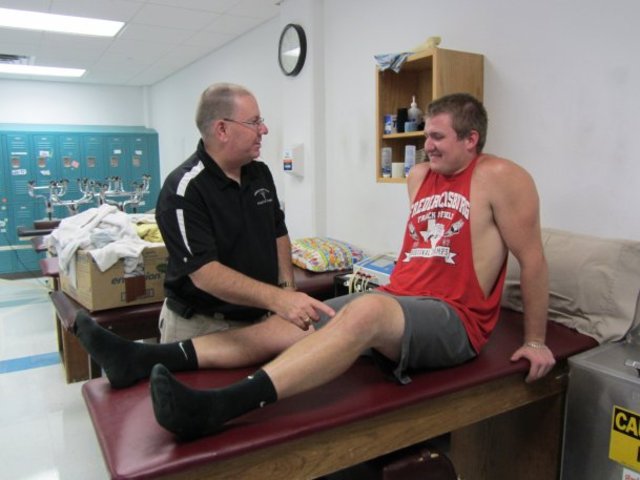
KAUZ-TV: Newschannel 6 Now | Wichita Falls, TX
A New York Giants tight end who made national headlines after contracting MRSA is finally out of the hospital.
The NFL player underwent seven surgeries and for some time doctors believed they would have to amputate his foot.
Newschannel 6 found out contracting this infection is not uncommon. We talked with a doctor at United Regional Hospital to learn more about this infection and to see what Midwestern State University athletics department is doing to protect its student-athletes.
Gary Dihme, Head Athletic Trainer at MSU has been caring for student-athletes for 15 years. He told Newschannel 6 he has seen his fair share of Methicillin-Resistant Staphylococcus Aureus or (MRSA) cases.
It’s a common infection spread amongst athletes. “Initially, when it first came out, we didn’t know exactly what we were dealing with,” said Dihme. “We starting seeing our first cases here in the early 2000’s and we’ve had a couple of cases of full blown MRSA.”
Earlier this month, New York Giants tight end Daniel Fells made headlines after he contracted the infection.
The NFL veteran underwent several surgeries and early reports indicated he might lose his foot.
He has since been released from the hospital. Dr. Scott Meyers, Assistant Director of Emergency at United Regional said Fells condition was abnormal.
“The odds of you getting an infection in your bone or an Osteomyelitis, which is what he had, the odds of getting that are so small in a healthy individual,” said Dr. Meyers.
However, MRSA can be spread through personal contact.
“So if someone as an abscess that’s draining, secretions on their skin and they come into contact with that, then yes it is transferable,” said Dr. Meyers.
He told Newschannel 6, he along with other doctors that work in the emergency room treat MRSA all the time, but what makes it different than other infections, it’s harder to treat because of the lack of antibiotics. However, he said you should not be alarmed.
“Very few of them ever progress to those serious, life-threatening infections that you read about, except in people who have other health problems like diabetes,” said Dr. Meyers.
Despite limited chances of deadly infections occurring staff at MSU do their best to keep student athletes healthy.
“Any open wounds, we try to get covered immediately before the individual goes back into play or competition,” said Dihme.
In addition to those precautions, university staff fumigate locker rooms frequently to kill any staph that may be growing on equipment used by athletes.
ORIGINAL ARTICLE:
http://www.newschannel6now.com/story/30325368/msu-athletics-mrsa-aware